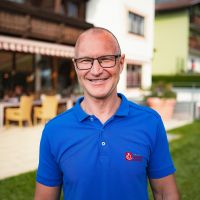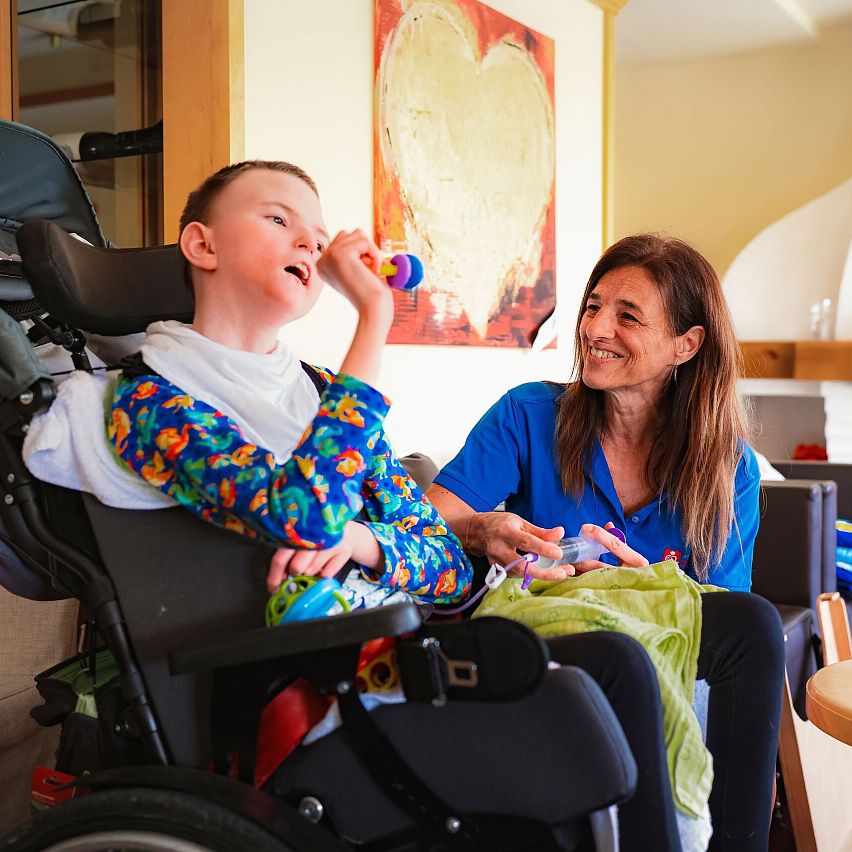
von Kathrin Ebenhoch
08 October 2025
HORST SZELI AND TEAM
Arche Herzensbrücken
For the past 10 years, Arche Herzensbrücken has been offering relief weeks for families with seriously ill children in Seefeld. Medical professionals, therapists, and volunteers take care of the parents, siblings, and the ill child – ensuring that everyone can enjoy a well-deserved break on Tirol’s High Plateau. The facility is currently one of a kind in the German-speaking region. It all began with Horst Szeli’s wish to make life just a little easier for these families.
My life’s mission is to make the lives of families with seriously ill children a little easier.
Call of the Heart
Sometimes you’ve always felt something deep inside, sometimes an external event shakes that feeling awake — and then the call becomes so strong that you can no longer ignore it. That’s what happened to Horst Szeli when, in 2012, he laid the foundation for Arche Herzensbrücken. His start in life had been a struggle due to complications at birth — something he wasn’t aware of for a long time, but which had already written his life mission into his heart: “To make the lives of families with seriously ill children a little easier.” In 2012, a personal event among close friends added the final impulse.
“Friends of ours who had long been caring for their seriously ill child received a 10-day holiday at a family hotel through donations,” Szeli recalls. “After three days, they came back in despair.” None of the hotel staff were allowed or able to care for their child — the entire burden remained on the parents, and the environment wasn’t suitable for medical care. Any thought of rest or recovery was out of reach. This hit Szeli to the core. He went to his wife Doris, who ran the Hotel Solstein in Seefeld, and asked her directly: “Can you imagine doing this differently in our place?” She immediately agreed: “I’ve received a lot of good things from life — here’s a chance to give something back. If you take care of everything else, I’ll provide the hotel.”
Leap into the Unknown
“Everything else” mainly meant a leap into the unknown. Szeli founded the Arche Herzensbrücken support association and met Ines Paratscher — a palliative care nurse from the Tyrolean lowlands who, driven by deep personal conviction, was working to establish a mobile palliative service in the Kitzbühel/St. Johann area. She was immediately on board in Seefeld as well. However, the legal framework was uncharted territory for everyone — and still is in some respects: “No lawyer could give us an immediate answer, since we remain the only hotel of this kind to this day.” Szeli wants to keep it that way — not to become a hospice or professional care facility.
On the one hand, the regulations are extensive and often questionable — sometimes even minor room details can lead to rejection. On the other hand, it’s precisely the hotel character that gives families so much. “Especially the siblings blossom and look forward to telling their classmates that they all went on holiday in Seefeld, not just ‘on rehab’ or ‘therapy’ for their sick brother or sister,” says Szeli.
It may seem like a small thing, but the crucial difference is that at Arche Herzensbrücken it’s not just about the sick child with the family as an appendage — it’s the family that stands at the center, who just happens to have a sick child along. This makes an enormous difference. Especially for families whose children suffer from rare diseases and who are often accompanied palliatively for many years, this sense of normality during their stay in Seefeld is a deeply heartfelt wish.
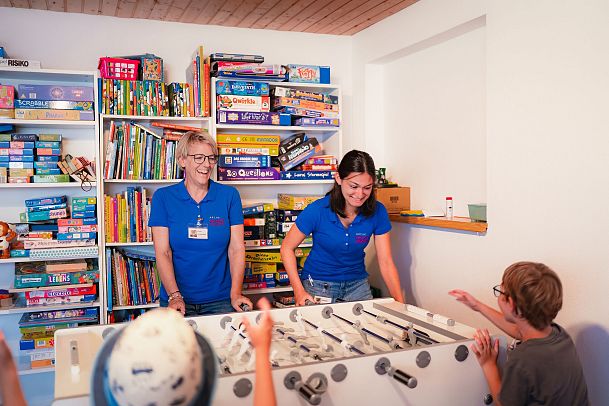
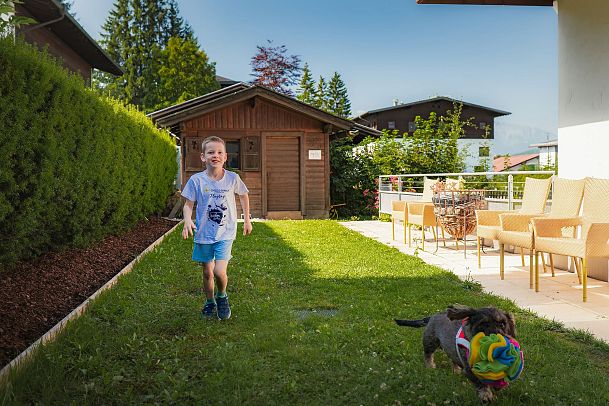
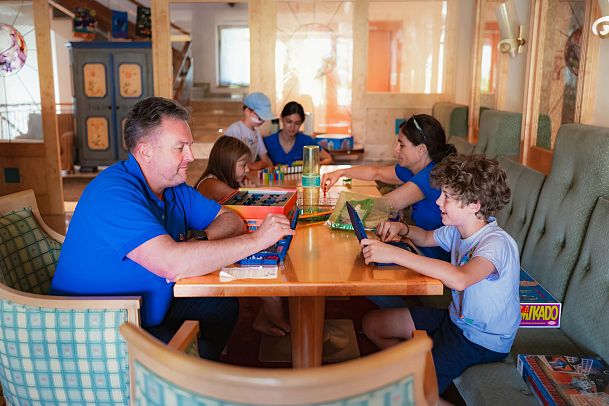
Premiere in 2015
In 2015, the first families finally arrived at the hotel – back then, Arche Herzensbrücken consisted of just five people: Doris managed the hotel operations, Ines took care of the medical care, a art therapist and a volunteer supported the families, and Horst kept everything together.
Today, the care team includes around 100 people. Alongside the core team, which remains the same to this day, there are 28 professional nurses working on a project basis to care for the children, 70 volunteers, and a team of therapists supporting the families. “Almost all of them take time off work or donate their free time to spend a few days a year with us,” Szeli says proudly. Only four nurses are employed part-time year-round, as they also handle pre- and post-care, make countless phone calls, and assist in the selection of families.
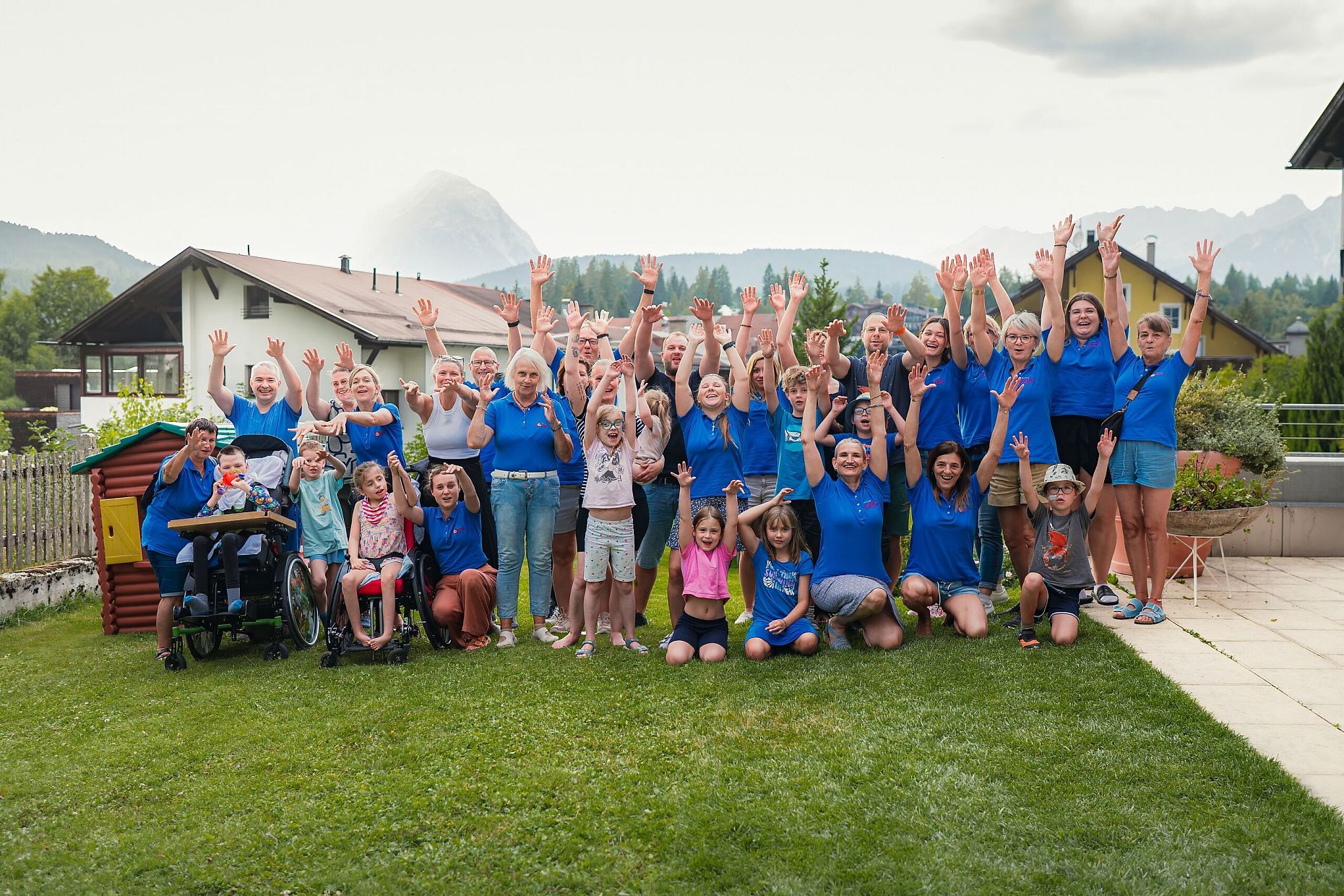
A Conscious Choice
The “triage,” as Szeli puts it bluntly, is the hardest part. Around 350 families have been supported over the past ten years – just a drop in the ocean. “We have very long waiting lists,” explains the man who seems to never run out of energy. Anyone with children aged 0 to 18 who fall into one of the disease groups defined by the international IMPaCCT working group for pediatric palliative care can apply for a stay at Arche Herzensbrücken. A particular focus in Seefeld lies on rare diseases, which affect fewer than one person per 2,000 inhabitants. “In 2013, I visited the Innsbruck Children’s Hospital together with its then head, Prof. Dr. Gerhard Gaedicke,” Szeli recalls. “He shared his heartfelt wish with me — to do something for children with rare diseases. Because they often fall through the cracks, as very few people know their conditions or pay attention to them.”
Inclusion and Its Limits
Until 2025, Arche Herzensbrücken also embraced this important topic. Alongside the four families with ill children per holiday week, there were also regular hotel guests. “The inclusion and interaction were enriching for everyone.” But over the years, one question became increasingly pressing: “How do we handle families whose children might pass away during their stay? Can death and grief of affected children and a carefree wellness holiday for unaffected families truly coexist under one roof?”
Palliative nurse Paratscher brings a wealth of experience to this sensitive issue. Together, the team reached a conclusion: “This is where inclusion ends, no matter how tolerant you are.” At the same time, the Arche Herzensbrücken team had known many families with palliative children for years, having accompanied them through multiple stays. So why shouldn’t a final visit still be possible? “When my wife retired from the hotel business this year, it was clear to us — now is the time,” says Szeli. “We’ll become an exclusive place for 4–5 affected families per week, and death may be part of it.” Doris will continue to volunteer, while the association takes over the hotel and expands the offer.
In 2026, Easter and Whitsun holidays will be added as relief weeks for affected families. In 2027, young adults will also be able to come — though some renovations are still needed for that. “We also want to offer grief and couple weeks for bereaved parents whose children have already passed away,” says Szeli, a certified life and social counselor with a strong belief in a family-oriented, systemic approach. “Because especially when 24-hour care suddenly falls away, you need someone to catch and support you.”
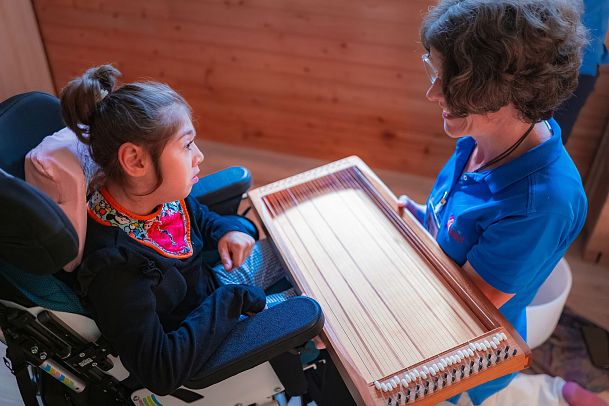
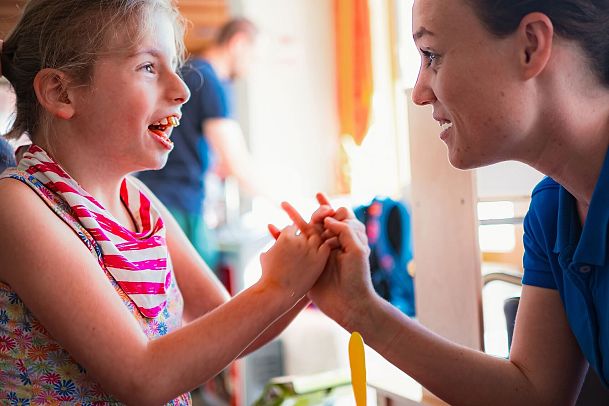
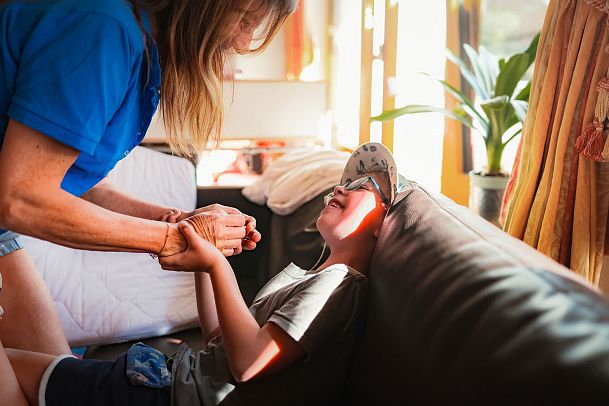
Learning to Relax
Even during their stay in Seefeld, it becomes clear how difficult it is for the mothers – who still carry most of the caregiving responsibilities – to truly let go. “For many, it’s only at the end of their first week with us that they manage to entrust their child for an afternoon entirely to our nursing staff.” When they finally get to spend a few hours enjoying wellness at our partner hotel, Hotel Quellenhof, it feels like a small miracle for everyone. The same applies to the precious hours when the siblings take center stage. Each of them is cared for by a dedicated volunteer. “When asked, ‘What would you like to do with me today?’ they often have no answer at first,” Szeli explains — a powerful reflection of the emotional world of these so-called “glass children.”
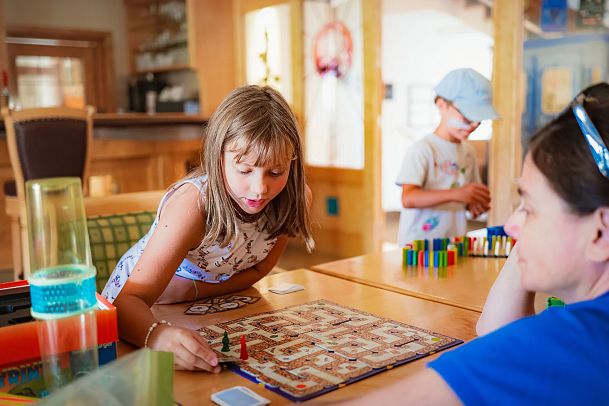
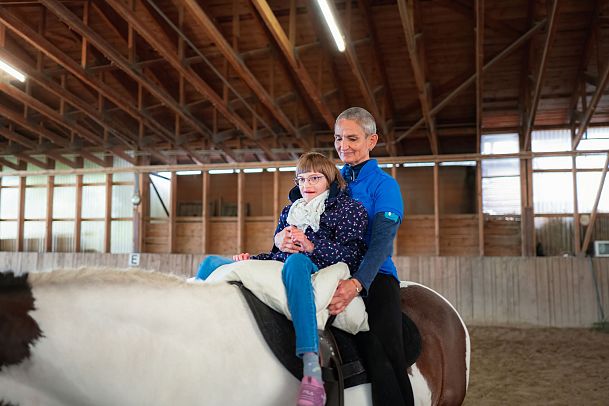
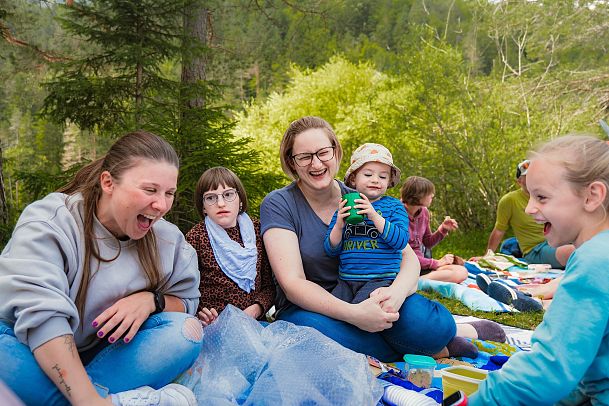
Funding Through Donations
A week in Seefeld for a family costs around €5,000 — money that affected families simply do not have. It is covered by the association, with families only paying a small income-based contribution. The organization is funded entirely through donations, and raising these funds is Szeli’s responsibility. Hiring dedicated staff or even a deputy manager would be too expensive, consuming too much of these precious resources. “But yes,” says the tireless Szeli, “I know I won’t be able to do this forever. I hope that Arche Herzensbrücken will continue and grow after me. I probably should start looking for and training someone — but right now, I’d rather spend that money on another nurse.”
Last year, Arche Herzensbrücken made headlines when it received half a million euros from Marlene Engelhorn’s Gute Rat initiative. “It was a blessing — the money allowed renovations, like adding a second care room; it brought valuable media attention, and it served as a seal of quality for us,” Szeli admits. “But it also had a downside — now people often say, ‘Well, you’ve got enough money now.’” A quick calculation shows that the roughly 60 families cared for each year cost the association about €300,000, not counting renovations or extra expenses. So half a million is spent very quickly.
Szeli’s dream for the future would be to find a social investor for whom money simply isn’t an issue. But reality looks different: Arche Herzensbrücken is grateful for every bit of support — every donation, every offer, every euro. “We’ve received so much help here on the plateau — our families get free ice cream, admission tickets, rental equipment, and so much more — it’s wonderful.” Especially touching are school fundraising projects and children’s donations. “And then there’s the Tyrol Choppers motorcycle group, who organize an event for us every year and take the siblings for a ride during the check handover.”
Szeli has countless heartfelt stories to tell — about the families, the children, the fundraisers, and the dreams he carries. Like the nighttime care for the children, “so that mum and dad can maybe just go out for dinner until 11 p.m., or simply sleep through the night for once.” A longing for just a touch of normality in a life full of extraordinary challenges.
How to Donate
A timeout in the Region Seefeld gives us all strength for everyday life. With your donation, you help make this possible for families with seriously ill children. Thank you for your support!
Förderverein Kinder und Jugendhospizarbeit
IBAN: AT90 3631 4000 0022 6571
BIC: RZTIAT22314
Facts about the strengths, development milestones, and goals of the heartfelt project Arche Herzensbrücken can be found in the fact sheet.
Good to Know at a Glance
Short Information
* Legally, Arche Herzensbrücken is an institution of the Förderverein Kinder- & Jugendhospizarbeit (supporting association). For easier understanding, the term Arche Herzensbrücken is used throughout this text.
** Rare diseases are, by definition, usually genetic, often chronic, and associated with severe and complex conditions. They can be life-threatening and/or result in permanent disability.
(Source: gesundheit.gv.at)
*** Children classified as palliative may visit Seefeld several times from the time of diagnosis onward.
**** The term “glass children” refers to siblings of seriously ill children whose own needs are often “invisible” due to the high demands of daily family life.
***** The funding is distributed over several years and paid out in installments.
